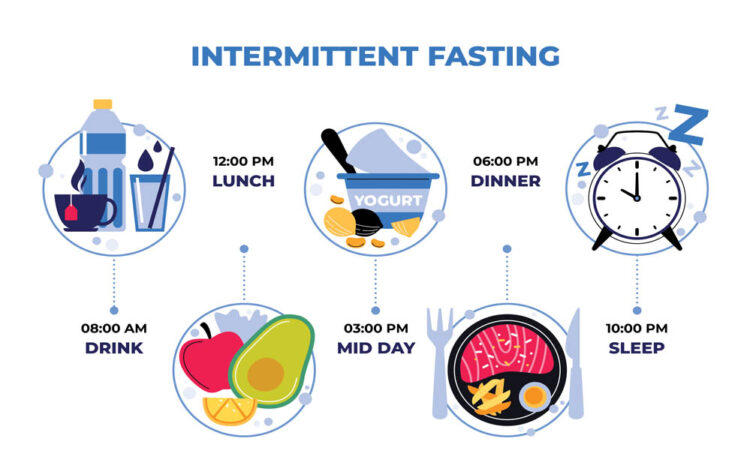Intermittent fasting has gained popularity as an effective method for weight loss and improved health. However, did you know that there are common mistakes that people make when practicing intermittent fasting that can hinder their progress? From diving into fasting too quickly to neglecting hydration, these errors can prevent you from reaping the full benefits of this eating strategy. In this article, we will explore the top 10 intermittent fasting mistakes and provide you with valuable tips to avoid them. Let’s dive in!
Key Takeaways:
- Avoid diving into intermittent fasting too quickly and start with a gradual approach.
- Choose a fasting plan that aligns with your lifestyle and preferences.
- Be mindful of your food choices during the eating window to maximize the benefits of fasting.
- Stay hydrated throughout the day to avoid dehydration.
- Don’t give up too soon. Persistence and patience are key to successful intermittent fasting.
Fasting Too Quickly
Jumping into intermittent fasting too fast can be a common mistake that many people make. Instead of starting with 24-hour fasts right away, it’s important to give your body time to adjust to this new eating schedule. Going from regular eating to a full day of fasting can be overwhelming and make you feel miserable.
The key is to ease into fasting gradually. A good beginner’s approach is to start with a 12:12 method. This means fasting for 12 hours and eating within a 12-hour window. This allows your body to get used to the idea of fasting without pushing it too much.
Once you feel comfortable with the 12:12 method, you can progress to a 16:8 fasting schedule. This means fasting for 16 hours and eating during an 8-hour window. This gradual adjustment can help your body adapt to the new eating pattern more easily, leading to a more successful and sustainable intermittent fasting experience.
Choosing the Wrong Plan
When embarking on an intermittent fasting journey, it is crucial to select a fasting plan that suits your lifestyle and preferences. Choosing the wrong plan can make the fasting experience challenging and unsustainable in the long run. Consider your daily routine, eating habits, and exercise regimen to find a fasting regimen that aligns with your unique needs.
Considering Your Lifestyle
One of the key factors to keep in mind when selecting a fasting plan is your lifestyle. If you are a night owl who enjoys late-night meals, starting your fast early in the evening may not be ideal for you. It’s important to choose a fasting schedule that allows you to maintain your preferred eating habits without feeling restricted. By considering your lifestyle factors such as work schedule, social commitments, and personal preferences, you can find a fasting plan that seamlessly integrates into your daily routine.
Finding a Sustainable Fasting Regimen
To ensure long-term success with intermittent fasting, finding a sustainable fasting regimen is essential. Sustainability involves selecting a fasting plan that you can adhere to over an extended period without feeling deprived or overwhelmed. If you engage in regular physical activity, it’s crucial to choose a fasting plan that provides enough energy and nutrients to support your exercise routine. Finding the right balance between fasting and nourishment is key to sustaining a healthy lifestyle.
By carefully considering your lifestyle and finding a fasting regimen that aligns with your needs and preferences, you can set yourself up for success on your intermittent fasting journey. Remember, the goal is long-term adherence and overall well-being.
| Factors to Consider when Choosing a Fasting Plan | Recommended Approach |
|---|---|
| Work Schedule | Select a fasting schedule that aligns with your work hours and allows you to feel energized and focused throughout the day. |
| Exercise Routine | Choose a fasting plan that allows you to maintain your exercise routine without compromising your energy levels or performance. |
| Sleep Patterns | Consider your natural sleep patterns and select a fasting window that aligns with your preferred sleep schedule. |
| Eating Habits | Find a fasting plan that accommodates your preferred eating habits, such as snacking or late-night meals. |
By taking into account these factors and finding a fasting plan that suits your lifestyle and personal preferences, you can create a sustainable and effective intermittent fasting regimen. Remember, the key is to choose a plan that supports your overall well-being and can be maintained in the long term.
Overeating During the Eating Window
One of the most common mistakes in intermittent fasting is overeating during the eating window. When practicing intermittent fasting, it is crucial to listen to your body’s hunger cues and eat enough to satisfy your needs without indulging in excessive eating. While it may be tempting to consume large quantities of food in a short amount of time, this can lead to binge eating and sabotage your weight loss goals.
During a prolonged fasting period, it is natural to feel excessively hungry, but it’s important to approach the eating window mindfully. Instead of giving in to emotional and physical deprivation, focus on choosing nutrient-dense foods that keep you full and satisfied. Opt for a balanced diet rich in fiber, protein, and healthy fats to nourish your body and prevent overeating.
“I used to struggle with binge eating during my intermittent fasting journey. I realized that I was depriving myself emotionally and physically, which led to overeating during my eating window. Once I started listening to my body’s hunger cues and choosing nutrient-dense foods, I was able to break free from the cycle of overeating and achieve better results.” – Sarah, intermittent fasting enthusiast
By being mindful of your food choices and eating in moderation, you can avoid the trap of overeating and support your weight loss goals. Remember, intermittent fasting is not about restrictive diets or deprivation but rather finding a sustainable and balanced approach to nourish your body.
Not Eating Enough During the Eating Window
While it may seem counterintuitive, not eating enough during the eating window can be a detrimental mistake when practicing intermittent fasting. Severely restricting calorie intake can lead to several undesirable consequences, including muscle loss and a slowed metabolism.
A restricted calorie intake deprives the body of the necessary nutrients it needs to function optimally. Without adequate nourishment, muscle mass can be compromised, resulting in a loss of strength and vitality. Moreover, a prolonged state of restricted calorie intake can lead to a slowed metabolism, making it increasingly difficult to achieve weight loss goals.
It is crucial to provide your body with sufficient nourishment during the eating window to support overall health and well-being. This includes consuming enough calories from a variety of nutrient-dense foods to meet your body’s energy and nutritional needs.
The Importance of Adequate Nourishment
Adequate nourishment during the eating window is essential for maintaining muscle mass, promoting a healthy metabolism, and ensuring proper bodily functions. Failing to fuel your body adequately can hinder your progress and make it harder to achieve your desired health and fitness goals.
Moreover, restricted calorie intake can lead to feelings of extreme hunger and deprivation, which may increase the likelihood of binge eating or falling off track with your fasting plan.
Restrictive diets and not eating enough during the eating window can create a cycle of emotional and physical deprivation. It’s important to find a balance and nourish your body properly while practicing intermittent fasting.
Consulting a Registered Dietitian
Consulting a registered dietitian can be beneficial if you’re unsure whether you’re consuming enough calories and meeting your nutritional needs during the eating window. A dietitian can assess your individual requirements, take into account any specific dietary concerns or restrictions, and provide personalized recommendations to ensure you are nourishing your body adequately.
By working with a dietitian, you can ensure that you’re striking the right balance between restricted calorie intake and providing your body with the necessary nourishment it needs for optimal health and well-being.
Ignoring Food Choices
While intermittent fasting primarily focuses on the time-restricted eating window, it is essential to pay attention to the quality of the foods you consume. Fasting alone is not a magic solution for weight loss or improved health. Instead, it is crucial to emphasize nutrient-dense, whole foods during the eating window to maximize the benefits of intermittent fasting.
When selecting your meals, make a conscious effort to choose foods that nourish your body and provide essential nutrients. Incorporate a combination of fiber, protein, and healthy fats into your meals, as they contribute to feeling satiated and provide a range of health benefits.
“The food you consume during intermittent fasting should be viewed as an opportunity to fuel your body with the necessary nutrients it needs for optimal functioning,” says Dr. Jane Thompson, a registered dietitian. “By selecting nutrient-dense foods, you can support your overall health and well-being.”
Opt for whole grains, lean proteins, fruits, vegetables, and healthy fats such as avocados, nuts, and olive oil. These foods not only provide essential vitamins and minerals but also promote a feeling of fullness, making it easier to adhere to calorie restriction during the fasting period.
| Food Choices to Emphasize During Intermittent Fasting | Food Choices to Avoid During Intermittent Fasting |
|---|---|
|
|
By prioritizing nutrient-dense food choices, you can support your overall health and optimize the benefits of intermittent fasting. Remember, the goal is to nourish your body and provide it with the necessary fuel, rather than solely focusing on calorie restriction.
Neglecting Hydration
Intermittent fasting may involve refraining from food, but it should not include intermittent drinking. It is essential to stay hydrated by drinking enough water, especially since you may be missing out on hydration from fruits and vegetables during the fasting period. Dehydration can lead to muscle cramps, headaches, and hunger pangs, so make sure to prioritize water intake throughout the day.
When practicing intermittent fasting, many people focus on when and what they eat, but they often overlook the importance of proper hydration. Not drinking enough water can have detrimental effects on your overall health and well-being. Water plays a crucial role in maintaining bodily functions, regulating body temperature, and aiding digestion. It also helps flush out toxins and waste products from your system.
During the fasting period, your body continues to lose water through various processes such as breathing, sweating, and urine production. Additionally, if you’re limiting your food intake, you may not be getting enough water from the natural hydration found in fruits and vegetables. These foods are not only a source of hydration but also provide essential vitamins, minerals, and fiber.
To ensure you stay adequately hydrated during intermittent fasting, here are some tips:
- Drink water regularly throughout the day, even during the fasting period. Aim for at least 8 cups (64 ounces) of water per day, or more if you’re physically active or in a hot climate.
- Listen to your body’s thirst signals. If you feel thirsty, it’s a sign that you need to hydrate. Don’t ignore this signal.
- Consider incorporating herbal tea, infused water, or electrolyte-enhanced drinks into your hydration routine. These can add flavor and provide additional nutrients.
- Avoid excessive caffeine consumption, as it can have a diuretic effect and lead to increased water loss.
- Monitor your urine color. Clear or light yellow urine is a good indication of hydration, while dark yellow or amber-colored urine may indicate dehydration.
Hydration is vital for overall health and is especially important when practicing intermittent fasting. By staying properly hydrated, you can prevent dehydration-related symptoms such as fatigue, dizziness, and headaches. Remember, water is a fundamental building block of life, and neglecting it can hinder your progress and well-being.
Lack of Persistence
One of the common mistakes that individuals make with intermittent fasting is giving up too soon. It’s important to understand that each person’s experience with this eating strategy can be different. If you find it difficult to stick to a fasting plan or if it doesn’t align with your body’s cues and needs, it may be necessary to explore alternative dietary approaches.
Contrary to popular belief, intermittent fasting is not the only path to achieving health and wellness goals. Sustainable and long-term success comes from finding an eating plan that works best for you and your unique circumstances.
Listening to your body’s cues and learning how to adapt your eating habits accordingly is crucial for maximizing results. It’s essential to strike a balance between challenging yourself to adhere to your fasting schedule and recognizing when it may be necessary to adjust or change your approach.
Dropout Rate
In a study conducted by the Journal of the Academy of Nutrition and Dietetics, it was found that the dropout rate for intermittent fasting can be attributed to the difficulty many individuals face in sticking to the prescribed eating window. The study revealed that participants who struggled with adhering to their fasting plan were more likely to discontinue their intermittent fasting journey altogether.
It’s important to remember that intermittent fasting is not a one-size-fits-all approach. While some people may find it relatively easy to maintain the fasting and eating windows, others may find it more challenging due to various factors such as work schedules, family commitments, or personal preferences.
By understanding and addressing the difficulties associated with intermittent fasting, individuals can make informed decisions about their eating patterns and explore alternative dietary strategies that better align with their unique circumstances and goals.
Listening to Your Body’s Cues
When it comes to intermittent fasting, it’s crucial to listen to your body’s cues and respond accordingly. Each person’s nutritional needs and preferences are different, and what works for one person may not work for another.
The key to long-term success with intermittent fasting lies in finding a balance between challenging yourself and respecting your body’s signals. If you experience extreme hunger or discomfort during the fasting period, it may be a sign that your body requires more nourishment. Likewise, if you consistently struggle with maintaining the fasting schedule, it may be an indication that the particular fasting plan is not suitable for you.
Being flexible and adaptable in your approach to intermittent fasting can help you find a sustainable eating pattern that benefits both your body and overall well-being.
Remember, achieving your health and wellness goals is a journey that requires persistence, patience, and the ability to make adjustments along the way. Don’t be discouraged if intermittent fasting doesn’t work for you initially; there are countless other dietary approaches to explore that may better suit your needs and lifestyle.
| Common Challenges | Potential Solutions |
|---|---|
| Extreme hunger during fasting | Consider adjusting the fasting and eating windows, include more satiating foods during the eating window |
| Inability to stick to the fasting schedule | Explore alternative fasting methods or consider other dietary approaches |
| Feeling deprived or restricted | Focus on nutrient-dense foods during the eating window to ensure satiety and satisfaction |
| Physical and emotional discomfort | Consult with a healthcare professional or registered dietitian for personalized guidance and support |
Conclusion
In conclusion, intermittent fasting can be a powerful tool for weight loss, improved health, and increased productivity. However, to ensure successful fasting, it is crucial to avoid common mistakes that can hinder your progress. Taking a gradual approach and finding a fasting plan that suits your lifestyle are key factors in optimizing your intermittent fasting experience.
Practicing mindful eating is also essential. Listening to your body’s cues and adjusting accordingly will help you nourish yourself adequately during the eating window without overeating or undereating. Additionally, staying hydrated by drinking enough water throughout the day is vital to support your overall well-being.
With persistence and patience, you can achieve your health and wellness goals through intermittent fasting. Remember, intermittent fasting is not a one-size-fits-all approach, and it may take time to find the fasting plan and eating schedule that works best for you. By incorporating these tips into your fasting routine, you can make the most out of intermittent fasting and enjoy its benefits in a sustainable manner.











